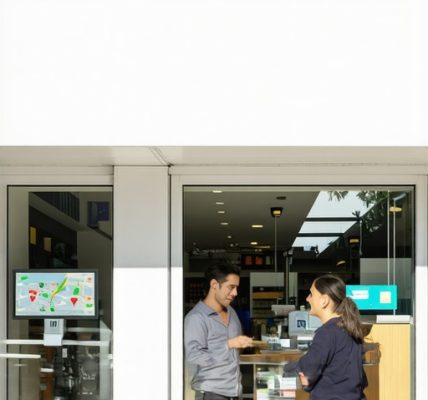Understanding Local SEO for Small Businesses
In today’s competitive market, local SEO has become an essential strategy for small businesses looking to enhance their visibility and attract more customers. With the rise of mobile searches and location-based queries, optimizing for local search results is no longer optional; it’s a necessity. This guide delves into effective growth hacks that can help small businesses thrive in their local markets.
Why Local SEO Matters for Small Businesses
Local SEO focuses on optimizing your online presence to attract more business from relevant local searches. When potential customers search for products or services nearby, they are often ready to make a purchase. By implementing effective local SEO strategies, small businesses can:
- Increase Visibility: Being listed in local search results and on platforms like Google Maps can significantly enhance your business visibility.
- Drive Foot Traffic: Local SEO helps direct customers to your physical location, increasing the chances of in-store visits.
- Build Trust and Reputation: Positive reviews and a strong online presence can build credibility within your community.
Effective Growth Hacks for Local SEO
To leverage local SEO effectively, small businesses should consider the following growth hacks:
1. Google My Business Optimization
One of the most critical steps in local SEO is creating and optimizing your Google My Business profile. This free tool allows businesses to manage their online presence across Google, including Search and Maps. Ensure your profile is complete with accurate information such as your business name, address, phone number, and operating hours. Regularly update your profile with posts, photos, and special offers to engage potential customers.
2. NAP Consistency
Maintaining consistent Name, Address, Phone Number (NAP) information across all online platforms is crucial for local SEO. Inconsistencies can confuse search engines and potential customers, leading to missed opportunities. Use tools to audit your citations and rectify any discrepancies to boost your local rankings.
3. Leverage Local Keywords
Incorporating local keywords into your website content can enhance your relevance in search results. Use tools like Google Keyword Planner to find popular local search terms related to your business. Create content that addresses local topics, such as a blog post on local business growth strategies or events happening in your area.
4. Encourage Customer Reviews
Online reviews play a significant role in local SEO rankings and consumer trust. Encourage satisfied customers to leave positive reviews on your Google My Business profile and other review sites. Responding to reviews, both positive and negative, shows that you value customer feedback and can enhance your business reputation.
5. Local Link Building
Building relationships with other local businesses and organizations can lead to valuable backlinks. Participate in community events, sponsor local charities, or collaborate on projects to earn links from local websites. This not only improves your SEO but also fosters community relationships.
Implementing these local SEO strategies can significantly improve your small business’s online presence. For further insights into maximizing your visibility, check out our post on NAP citation consistency. By focusing on local SEO, you can attract more customers and drive sustainable growth.
Advanced Local SEO Strategies for Small Businesses
As the digital landscape evolves, small businesses must adopt advanced local SEO strategies to stay competitive. By implementing a comprehensive approach, you can not only enhance your visibility but also ensure long-term success in attracting local customers.
6. Optimize for Voice Search
With the rise of smart speakers and voice-activated devices, optimizing for voice search is becoming increasingly important. Many users now perform local searches using voice commands, so it’s essential to tailor your content for these queries. Focus on natural language and long-tail keywords that mimic conversational speech. For example, instead of targeting “pizza near me,” consider phrases like “Where can I find the best pizza in [Your City]?” This strategy can improve your chances of appearing in voice search results.
7. Utilize Local Structured Data Markup
Implementing structured data markup can enhance your search visibility by providing search engines with more information about your business. Use schema markup to specify your business type, location, and contact details. This can lead to rich snippets in search results, making your listing more attractive to potential customers. Additionally, structured data can improve your chances of appearing in featured snippets, further increasing your visibility.
8. Engage with the Local Community on Social Media
Social media is a powerful tool for building relationships and engaging with your local community. Create content that resonates with your audience and encourages interaction. Share local events, promotions, and success stories to foster a sense of community. Engage with local influencers and collaborate on social media campaigns to expand your reach. By being active on platforms like Facebook and Instagram, you can strengthen your local presence and drive traffic to your website.
9. Create Location-Specific Landing Pages
If your business serves multiple locations, consider creating location-specific landing pages. These pages should include relevant keywords, unique content, and local information for each area you serve. This approach not only improves your SEO but also enhances the user experience by providing tailored information. Make sure to include calls-to-action that encourage visitors to engage with your business, whether it’s signing up for newsletters or visiting your physical location.
10. Monitor and Analyze Your Local SEO Performance
Regularly monitoring your local SEO performance is crucial for ongoing success. Use tools like Google Analytics and Google Search Console to track your website traffic, search rankings, and user behavior. Analyze which keywords are driving traffic and which strategies are yielding the best results. This data will help you adjust your tactics, improve your local SEO efforts, and identify new growth opportunities. For more insights into maximizing your visibility, check out our post on local business growth strategies.
By adopting these advanced strategies, small businesses can significantly enhance their local SEO efforts. Remember, the key to success lies in continuous optimization and engagement with your community, ensuring that your business remains top-of-mind for local consumers.
11. Leverage Customer Reviews for Local SEO Benefits
One of the most effective ways to enhance your local SEO is through customer reviews. Positive reviews not only build trust with potential customers but also signal to search engines that your business is reputable. Encourage your satisfied customers to leave reviews on platforms like Google My Business, Yelp, and Facebook. Responding to reviews, whether positive or negative, shows that you value customer feedback and engagement. This interaction can further boost your local search rankings.
12. Optimize Your Google My Business Listing
Your Google My Business (GMB) listing is a crucial component of local SEO. Ensure that all information is accurate and up-to-date, including your business name, address, phone number, and working hours. Utilize high-quality images to showcase your products or services. Additionally, take advantage of GMB features such as posts, Q&A, and messaging to engage with customers directly. A well-optimized GMB listing can significantly improve your visibility in local search results, making it easier for customers to find and connect with you.
13. Implement Local SEO Content Marketing Strategies
Creating valuable content that resonates with your local audience is key to effective local SEO. Consider writing blog posts about local events, industry news, or community highlights that relate to your business. This not only positions you as a local authority but also attracts organic traffic. Incorporate local keywords naturally throughout your content to optimize for search. For more tips on content strategies, explore our post on Google Maps SEO strategies.
14. Build Local Backlinks to Enhance Authority
Link-building is essential for improving your website’s authority. Focus on acquiring local backlinks from reputable sources within your community. Collaborate with local organizations, participate in local events, or sponsor community initiatives to gain exposure and backlinks. These links not only drive traffic but also signal to search engines that your business is a trusted entity in the local market.
15. Use Social Proof to Boost Engagement and Trust
Incorporating social proof into your marketing strategy can enhance your local SEO efforts. Showcase testimonials, case studies, or user-generated content that highlights customer satisfaction. This not only builds credibility but can also encourage potential customers to choose your business over competitors. Social proof can be effectively utilized on your website, social media channels, and even within your Google My Business listing.
By implementing these additional strategies, small businesses can further strengthen their local SEO presence. Remember, the local search landscape is dynamic, so continually refining your approach and engaging with your community will help ensure sustained success.
16. Utilize Localized Social Media Marketing
Social media is a powerful tool for enhancing your local SEO efforts. By creating localized content and engaging with your community on platforms such as Facebook, Instagram, and Twitter, you can increase brand awareness and drive traffic to your website. Share updates about local events, promotions, and customer stories that resonate with your audience. Additionally, using location tags and local hashtags can improve visibility and attract potential customers in your area.
17. Optimize for Voice Search in Local SEO
With the rise of smart speakers and voice-activated devices, optimizing for voice search is becoming increasingly important for local businesses. Focus on using natural language and question-based keywords in your content, as many voice searches are conducted in a conversational tone. For example, instead of targeting “best pizza near me,” consider optimizing for questions like “Where can I find the best pizza in [your city]?” This approach aligns with how users typically interact with voice search technology.
18. Harness Video Marketing for Local Engagement
Video content is highly engaging and can be a significant asset for your local marketing strategy. Create videos showcasing your products, services, or community involvement. Platforms like YouTube and Instagram allow you to reach a broader audience. Additionally, consider live streaming local events or Q&A sessions to engage directly with your audience. Video can enhance your online presence and improve local search rankings by keeping users on your page longer.
19. Monitor Local SEO Performance with Analytics Tools
To effectively optimize your local SEO strategy, it’s essential to monitor your performance using analytics tools. Tools like Google Analytics and Google Search Console provide insights into how your website is performing in local search results. Analyze metrics such as organic traffic, bounce rates, and conversion rates to identify areas for improvement. This data-driven approach enables you to make informed decisions and refine your local SEO tactics.
20. Collaborate with Local Influencers
Partnering with local influencers can significantly boost your visibility and credibility within your community. Influencers often have established followings and can effectively promote your business to their audience. Look for influencers who align with your brand values and target demographic. This collaboration can take various forms, such as sponsored posts, product reviews, or hosting local events together. Influencer partnerships can enhance your local SEO by driving traffic and generating backlinks from their platforms.
By implementing these advanced strategies, you can further elevate your local SEO game and ensure your business stands out in a competitive landscape. Always stay updated on the latest trends and adapt your strategies accordingly to maintain your edge in local search rankings.
21. Implement Geo-Targeted Advertising
Geo-targeted advertising allows you to reach potential customers based on their location. By using platforms like Google Ads or Facebook Ads, you can create targeted campaigns that specifically appeal to audiences in your local area. This can be particularly effective when promoting special offers or events. Make sure to use location settings to ensure your ads are only shown to users within a certain radius of your business, optimizing your advertising spend and increasing conversion rates.
22. Engage with Local Online Communities
Joining local forums, community boards, and social media groups can enhance your local SEO efforts. By actively participating in discussions and offering valuable insights, you can position yourself as an authority in your niche. This not only helps build relationships with potential customers but can also generate backlinks to your website, boosting your search engine rankings. Sites like Reddit or local Facebook groups can be excellent platforms for engagement.
23. Leverage User-Generated Content
User-generated content (UGC) is an effective way to build trust and community engagement. Encourage customers to share their experiences and photos related to your business on social media. You can create campaigns that incentivize sharing, such as contests or giveaways. UGC not only provides fresh content for your website but also helps improve your local SEO by showcasing real-life interactions with your brand.
24. Optimize Your Google My Business Listing Regularly
Your Google My Business (GMB) listing is crucial for local search visibility. Regularly update your GMB profile with accurate information, including business hours, contact details, and photos. Additionally, respond to customer reviews promptly, as this shows potential customers that you value their feedback. Using posts on your GMB profile to share news, offers, or events can also enhance engagement and drive traffic to your site.
25. Focus on Consistency in NAP Information
Ensuring consistency in your Name, Address, and Phone number (NAP) across all online platforms is vital for local SEO. Discrepancies can confuse search engines and negatively impact your ranking. Regularly audit your online presence to ensure that your NAP information is accurate on your website, social media profiles, and local directories. This consistency builds trust with search engines and improves your chances of ranking higher in local searches.
Frequently Asked Questions
What is local SEO and why is it important?
Local SEO is the process of optimizing your online presence to attract more business from relevant local searches. It is important because it helps businesses connect with customers in their geographic area, improving visibility and driving foot traffic to physical locations.
How can I improve my local SEO ranking?
You can improve your local SEO ranking by optimizing your Google My Business listing, ensuring consistent NAP information, gathering customer reviews, and creating localized content. Engaging with your local community through social media and events also helps boost your visibility.
What role do reviews play in local SEO?
Customer reviews are crucial for local SEO as they influence your business’s online reputation and visibility. Positive reviews can improve your rankings in local search results and attract more customers. Encouraging satisfied customers to leave reviews on platforms like Google and Yelp is essential.
How does mobile optimization affect local SEO?
Mobile optimization is critical for local SEO since many local searches are performed on mobile devices. Ensuring your website is mobile-friendly improves user experience, reduces bounce rates, and enhances your chances of ranking higher in local search results.
Can social media impact local SEO?
Yes, social media can impact local SEO by increasing brand awareness and driving traffic to your website. Engaging with local audiences on social media platforms can also lead to more shares and backlinks, further improving your search rankings.
How often should I update my Google My Business listing?
You should update your Google My Business listing regularly, especially when there are changes in your business hours, services, or promotions. Frequent updates keep your information accurate and engage potential customers.
Is it necessary to have a local website for local SEO?
While it’s not strictly necessary to have a separate local website, having a well-optimized website that targets local keywords and provides relevant content can significantly enhance your local SEO efforts.
What is the importance of citations in local SEO?
Citations are mentions of your business’s NAP information across the web. They are important for local SEO because they help establish your business’s credibility and authority, influencing your search rankings.
Authority Resources for Local SEO
For those looking to dive deeper into local SEO strategies and best practices, the following resources are highly recommended:
- Moz’s Local SEO Guide – Comprehensive insights into local SEO tactics and strategies.
- Search Engine Land’s Local SEO Guide – A detailed overview of local SEO, including tips and tools.
- BrightLocal’s Local SEO Resources – A collection of articles, tools, and case studies focused on local search optimization.
- Search Engine Journal’s Local SEO Guide – Expert advice and strategies for improving your local search rankings.
- Neil Patel’s Local SEO Strategies – Insights and actionable tips from a leading digital marketing expert.
Implementing these advanced strategies and utilizing the resources provided can help you achieve significant growth in your local SEO efforts. By continuously refining your approach and staying updated with the latest trends, your business can thrive in the competitive local market.


